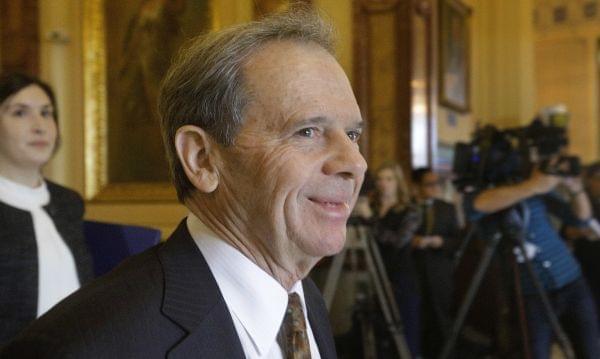Illinois Senate Makes Progress On ‘Grand Bargain’

Illinois Senate President John Cullerton, D-Chicago, walks into Illinois Gov. Bruce Rauner's office during veto session at the Illinois State Capitol Wednesday, Nov. 30, 2016, in Springfield. AP Photo/Seth Perlman
The Illinois Senate has moved forward on pieces of a budget compromise. But the tough votes are scheduled for Wednesday. The Senate approved non-contentious parts of what's called the "grand bargain'' on Tuesday. It's an effort to find a breakthrough on a two-year stalemate between Gov. Bruce Rauner and the Legislature.
The Republican governor won't agree to a tax increase to tackle a multibillion-dollar deficit without regulatory changes to strengthen business and weaken unions.
Democrats control the Senate and provided most of the votes Tuesday to approve plans to streamline state purchasing, expand casino gambling and more.
After 20 months without a budget, Senate President John Cullerton says he thinks the harsh reality of Illinois’ deficit will help pass the more controversial parts of the deal.
“This is the classic compromise," he said. "So you get as much as you can and you don’t overestimate how much you think you’re entitled to."
But Cullerton's pension overhaul failed.
He said he'll call it again Wednesday and is confident that tough votes on an income tax increase and a local property tax freeze will occur.
One piece of the grand bargain failed so far: a measure to cut government pension benefits, though that could be brought back for another vote.
The 31-26 party-line vote to expand gaming, which would a casino in Danville, saw a 'yes' vote from Champaign Senator Scott Bennett (D-Champaign), but no's from Jason Barickman (R-Bloomington), Chapin Rose (R-Mahomet), and Dale Righter (R-Mattoon.) Senator Andy Manar (D-Bunker Hill) did not vote.
Every component of the deal must pass or none of it can become law.
Links
- Senate Democrats Growing Impatient With Republicans On Budget Deal
- Illinois Senate Discusses Budget Privately, Takes No Vote
- Senate Leaders: Not Backing Off ‘Grand Bargain’
- Optimistic Tone, Praise For Senate Budget Efforts In Governor’s State Of The State Address
- Compromise Budget Plan Could See Action This Week In State Senate
- State Senate Budget Compromise Put On Hold
- No Meeting Of Budget Aides Adds To Confusion Over Governor’s Budget Plan
- Governor Bruce Rauner’s Budget Address, Annotated
- State Senators Could Vote On “Grand Bargain” Today
- As Rauner Hunts For A Grand Bargain, He’s Leaving The Actual Bargaining To Others

